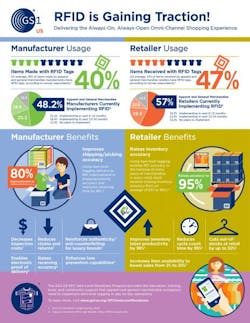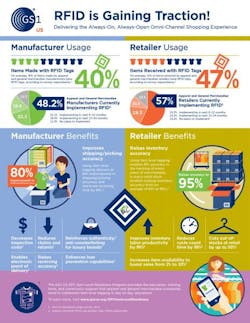Why should trucking companies care? Because RFID-tagged cargo is going to provide a lot more “granular” logistical information about how and where goods go in the supply chain network – data that could ultimately affect the freight motor carriers get to haul.
"After seeing the proven benefits of RFID in pilot programs, both manufacturers and retailers are realizing its many long-term business advantages," said Melanie Nuce, VP of apparel and general merchandise for GS1 US, which conducted this survey.
"As industry collaboration and discussion grows, it will be difficult for companies to ignore RFID's role as a critical enabler of inventory visibility and the seamless customer experience,” she added.
The firm polled apparel and general merchandise manufacturers and retailers regarding their use of Electronic Product Code (EPC)-enabled RFID to enhance inventory visibility among other benefits.
Here’s what GS1 US said it found:
- Nearly half (48.2%) of the manufacturers surveyed responded that they are currently implementing RFID, while another 21.1% are planning to implement RFID within the next 12 months.
- Some 40% of items made by apparel and general merchandise manufacturers today have RFID tags.
- More than half (57%) of the retailers in this poll reported that they are currently implementing RFID, with another 19.3% planning to implement RFID within the next 12 months.
- Respondents reported that on average 47% of items received by apparel and general merchandise retailers have RFID tags.
"These findings confirm that the retail industry is nearing an RFID adoption and usage tipping point," said Bill Hardgrave, dean of the Harbert College of Business and founder of the RFID Lab, Auburn University, within the GS 1 US study.
"RFID is no longer just something proven in concept—it is providing tangible results for manufacturers and retailers, and provides the inventory accuracy that omni-channel retailing demands," he added.
The appeal of RFID is pretty straightforward, Hardgrave noted, especially for manufacturers in terms of reinforcing authenticity, decreasing inspection costs, reducing shrinkage and enhancing logistics accuracy.
For retailers, RFID provides greater than 95% inventory accuracy, improved sales, decreased out-of-stocks, increased margins and expedited returns, according to Auburn University’s research.
A logistical trend to keep in mind as freight itself becomes increasingly connected to more and more electronic communication pathways.

